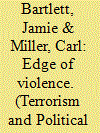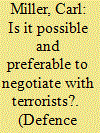|
|
|
Sort Order |
|
|
|
Items / Page
|
|
|
|
|
|
|
| Srl | Item |
| 1 |
ID:
110759


|
|
|
|
|
| Publication |
2012.
|
| Summary/Abstract |
Radicalization is often seen as a first, prerequisite step along the road towards terrorism. Yet to be radical is merely to reject the status quo, and not necessarily in a problematic or violent way. In Part 1-"Radicals"-this article compares the backgrounds, ideologies, behaviours, and attitudes of a sample of "violent radicals" with both radical and "mainstream" non-violent sample groups. By finding both what the violent and non-violent samples share, and also what they do not, the article hopes to achieve a more adept discrimination of violent and non-violent radicalization. In Part 2-"Radicalization"-the article suggests that, in addition to being an intellectual, rational, and religious decision, becoming a terrorist is also an emotional, social, and status-conscious one.
|
|
|
|
|
|
|
|
|
|
|
|
|
|
|
|
| 2 |
ID:
116171


|
|
|
|
|
| Publication |
2012.
|
| Summary/Abstract |
We introduce the latest member of the intelligence family. Joining IMINT, HUMINT, SIGINT and others is 'SOCMINT' - social media intelligence. In an age of ubiquitous social media it is the responsibility of the security community to admit SOCMINT into the national intelligence framework, but only when two important tests are passed. First, that it rests on solid methodological bedrock of collection, evidence, verification, understanding and application. Second, that the moral hazard it entails can be legitimately managed. This article offers a framework for how this can be done.
|
|
|
|
|
|
|
|
|
|
|
|
|
|
|
|
| 3 |
ID:
103899


|
|
|
|
|
| Publication |
2011.
|
| Summary/Abstract |
It has been a staple assumption that terrorists 'do not want a place at the table: they want to shatter the table'. Across policymakers, academia and a wider commentariat, this position - that negotiation with the 'new' Islamist terrorist actor is both impossible and, anyway, highly undesirable - is so commonplace that the question has scarcely been raised. But is it true? The article considers the five pillars on which the no-negotiation position rests. First, 'rationality': are terrorists pathologically mad or fanatical? Second, 'viability': are there common interests or is this a zero-sum game? Third, 'representation': can terrorists fit into a diplomatic system recognising representative parties? Fourth, 'legitimacy': can diplomacy, as a system of norms, conventions and practices be applied to agents who reject this system wholesale? Fifth, 'preferability': even if possible, is it either strategically or ethically right to do so? The case on this question should not be closed yet.
|
|
|
|
|
|
|
|
|
|
|
|
|
|
|
|
|
|
|
|
|